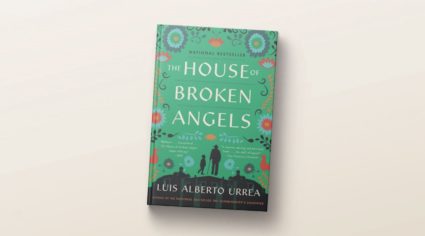Our July pick for the PBS NewsHour-New York Times book club is Luis Alberto Urrea's "The House of Broken Angels." Become a member of the Now Read This book club by joining our Facebook group, or by signing up to our newsletter. Learn more about the book club here.
Below are questions to help guide your discussions as you read the book over the next month. You can also submit your own questions for Urrea on our Google form here. Urrea will answer reader questions on the NewsHour broadcast at the end of the month.
- An epigraph to this book comes from singer/songwriter Rick Elias: "This is my confession of love." Why do you think Urrea began the book this way?
- From the start, it's clear this book will revolve around both a party and a funeral. How is this story both a tragedy and a comedy?
- Why do you think Urrea chose the title "The House of Broken Angels"?
- Where do Big Angel's insecurities come from? Where do Little Angel's?
- Many characters wander through this book. Which one did you identify with most?
- Urrea uses vivid language, description and metaphor throughout the text. Write down a sentence you particularly enjoyed.
- Urrea writes that he loved reading "The Godfather" growing up, because it was about "La Familia." How is "The House of Broken Angels" his own take on this theme?
- What about this family reminded you of your own?
- Urrea said this book was inspired by the death of his eldest brother, for whom his family gave a funeral that was actually more like a big party. Does this book read as deeply personal to you?
- Urrea was born in Tijuana, Mexico, before moving across the border, and then to San Diego, where this book is set. What are the sights, smells, sounds that stick with you from scenes on both sides of the border?
- In light of the current political debate around immigrant families, what did you learn about migration from this fictional Mexican-American family?
- At one point in the novel, Little Angel says: "If only the dominant culture could see these small moments, they would see their own human lives reflected in the other." Do you believe this to be true?
Support Canvas
Sustain our coverage of culture, arts and literature.

